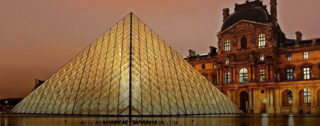After being invited for a private dinner in Paris, a foreign entrepreneur decided to reciprocate the gesture by offering two bouquets of chrysanthemums and bringing a best-of-breed wine from his own country. The meal didn’t last long; It is only after the dinner the entrepreneur found out that chrysanthemums are primarily used as funeral flowers in France. He also realised that he should have not brought wine, because his small gift implied that the host could not choose a good wine himself.
Today Translations’ network of translators, interpreters and international business consultants extends to the UK’s closest continental neighbour. For many UK businesses, France is considered the strongest export market and the gateway to trading with the rest of the European Union.
Why invest in France?
- France is the EU’s second largest economy (and fifth largest in the world) and second largest exporter in the EU, according to the WTO.
- No surprise, therefore, that it is one of the world’s largest export hubs and logistics networks, boasting two of Europe’s biggest ports, in Marseille and Le Havre, while Paris Charles de Gaulle airport is Europe’s busiest airport for cargo transportation.
- Thanks to its location at the heart of Western Europe, France’s transport network is one of, if not the best on the continent with more than 11,000 km of motorway, and high-speed train links to other major European cities, including Brussels, Amsterdam and London.
- France is a world leader when it comes to its strong focus on innovation and R&D, especially in the telecommunications, pharmaceuticals and civil engineering industries. Compared to other countries, France is the third leading recipient of foreign R&D investments, while it also offers the most incentivised research tax credits in all of Europe.
- Foreign companies with offices and staff members in France embrace this particular business culture, accounting for 29% of business expenditure enterprise R&D expenditure and one-third of all French exports.
- Despite experiencing slight economic setbacks in recent years, France has managed to maintain its status a world leader within the trade and tourism industries, while the state continues to invest in infrastructure and research and development (R&D).
Business Mentality
- French executives tend to focus on long-term business relationships.
- Business people in France are usually straightforward, questioning, and probing. They tend to treat the business discussion as an intellectual exercise. Therefore, logic will dominate discussions, which at times might become intense.
- Keep in mind that the focus of an argument may change during the discussion.
- Do not get startled if one’s personal ideologies are included in the presentation as it is usual.
- The French won’t normally accept anything that goes away from their cultural norm and will avoid taking high risks. However, note that they are receptive to new information; just make sure you present strong arguments.
- The decision making pace in the French business etiquette is rather slow. Decisions are usually not made at the first meeting, because business people prefer to discuss things in detail with somebody at the top.
- Therefore, patience will be appreciated whereas pressure will be taken negatively. Likewise, aggressive selling techniques will not generate a positive response; focus on discussion and exchange of information.
- Business hours are from 8:30 / 9:00 am to 6:30 /7:00 pm.
Greetings
- The appropriate greeting is a handshake. French style handshakes are known to be brisk and light. You should expect a loose grip with only one or two up and down movements. If you’re not familiar with this light style of handshake, you could easily walk away with the costly wrong impression that the other person is in a hurry to get away from you!
- Kissing cheeks across genders is a common greeting among colleagues at work, but do not attempt to do it until your female counterpart makes the initial move.
- Regarding titles of courtesy, it is customary to only use first names when invited to do so. Sometimes the French will introduce themselves by saying their surname first, followed by their Christian name.
The Art of Conversation
- It is highly recommended that you learn some basic French phrases. Your efforts will be praised and the French will go back to English if they realise you are struggling.
- Welcome topics of conversation include praising French cuisine, art, music and philosophy.
- Try to express opinions only on topics you are familiar with. Be prepared to answer questions about your country, especially regarding history and politics.
- Avoid asking your French counterpart about their political inclinations nor money earnings – it is considered rude.
- Do not criticise Napoleon.
- Do not discuss personal matters during business negotiations.
- It is common for French people to ask a lot of questions and to interrupt somebody before having finished their argument. It is a common habit which signifies interest in the speaker and in the discussion. Take it as a positive sign and do the same!
Basic Facts
- The official name of France is the French Republic.
- Official language – French.
- The capital and largest city is Paris, also known as “City of Lights”
- France’s population is 65 million people.
- France is the world’s leading tourist destination in terms of visitor numbers ahead of the USA and China, averaging more than 80 million per year.
- There are already 20,000 foreign business with offices in France, accounting for around 2 million employees.
Business meetings and meals
- Relationships are an important part of French business culture, and you will often spend a few minutes getting to know your colleagues before discussing business.
- However, they have a strong sense of privacy exhibited in their definite distinction between business and personal life. Do not expect to be invited out in the evenings after work as most people will go home to their families.
- First impressions in France are heavily dependent on appearance, so quality business attire with some jewellery and accessories are welcome. However, if you come across as dressed too fancy or uncommonly, the reactions will not be positive.
- Wear only conservative clothing of the finest quality.
- An invitation stating “informal dress” does not imply a t-shirt and shorts! At social gatherings, “informal” usually means a jacket and tie for men.
- You should be punctual, but you won’t be late if you arrive ten minutes after the scheduled time.
- There is no need to have your business cards translated, as most French executives read English. If you do have it printed in French, mention your position and your university degree.
- Avoid two-sided cards.
- Presents should be treated with discretion – small gifts may be exchanged, but not at the first meeting and definitely not with your business card.
- Lunch is one of the best places to forge business relationships in France, but business lunches are not as common as they used to be. If invited to one, it is always polite to accept.
- It may last for more than two hours.
Body language
- Good posture is essential in the French business etiquette.
- Eye contact is important as long as it is not too obtrusive.
- The distance between people is rather close when talking to each other. Touching and patting is also commonplace in the French business etiquette.
- Make sure to have your hands out of your pockets at all times. Do not snap your fingers!
- Slapping an open palm over a closed fist is considered rude.
- The OK sign (a circle with the thumb and a forefinger) means “zero” or “useless” in France. It’s best to show approval by raising your thumb.
- The number of times the French kiss each other as a form of greeting varies depending on region. In Corsica, the number of kisses can be as many as 5!
Copyright Notice:
Third parties are allowed to use or reference information on this page for non-commercial use only if they acknowledge this website as the source by linking to it.
Read detailed Terms and Conditions on how to apply for commercial use.











